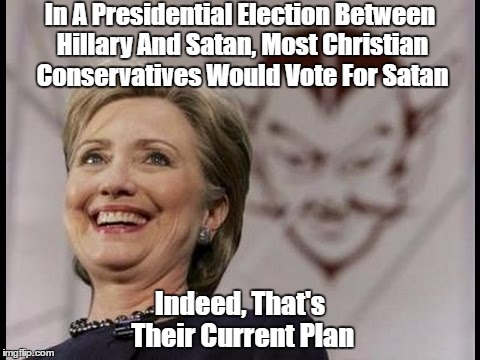 |
Compendium Of Pax Posts About Donald Trump, Updated July 31, 2016
http://paxonbothhouses.blogspo
A Catalog Of Hillary Clinton's Achievements
http://paxonbothhouses.blogspo
Hillary Clinton's New Deal
Ryan Cooper
Donald Trump continues to dominate news cycle after news cycle with his increasingly unhinged antics. Just last week, he seemed to imply that someone should assassinate Hillary Clinton and said that President Obama somehow founded ISIS, leading to a deluge of media attention.
But unlike during the Republican primary, when such behavior paid enough electoral dividends to win him the election, all this constant attention is destroying his standing among the general population. The latest polls have him facing annihilation in basically every swing state, some by double-digit margins.
Unless something changes between now and November — and it will have to be something big — Hillary Clinton is going to win this election in a complete blowout, perhaps by big enough margins to retake Congress. It's an extremely unusual chance to actually push through some big policy, which raises the question: Where is Clinton's big plan?
Franklin D. Roosevelt had his New Deal, and Lyndon B. Johnson had his Great Society, both of which went some ways towards building a society that provided a decent standard of living to everyone, without exception. In the 1930s, "New Dealer" meant something. Hillary Clinton can try to finish the job with her own branded policy package — the New Deal Squared? The Extremely Good Society? — that will provide a unifying vision and rallying symbol. Here are some suggestions.
1. Health care: This is where Clinton's current plans are the strongest. FDR helped people get insurance through their employers, LBJ gave insurance to the elderly and the poor, while Obama, in theory at least, provided it to everyone else who didn't already have it. However, there are still many people without coverage, and many of the ObamaCare exchange-bought policies are mediocre at best.
Clinton proposes that people be allowed to buy into Medicare starting at age 55, and a public option to provide some competition on the ObamaCare exchanges. Both are excellent ideas. But one quick, easy, and sure-to-be-popular expansion is to put every child 18 and under on Medicare. This would be relatively cheap, since children do not use that much care on average, but would be a lifesaver for families with kids who have complicated conditions.
2. Poverty: Binyamin Applebaum notes, correctly, that neither campaign is paying more than a whisker of attention to poor people. Given Democrats' deficit phobia and history of selling out the poor, it's perhaps unrealistic to expect a total eradication of poverty to be on the agenda.
But there is one sub-group of the poor that might be sympathetic enough to garner Democrats' attention: children. Unlike in FDR's day, the age structure of poverty today is heavily tilted towards the young. Nearly 17 percent of children live in poverty — meaning they constitute a quarter of all poor people. The reason why is obvious: Children cost a ton of money and generally require time off work, and usually come early in parents' careers when their earning potential is lowest.
Furthermore, there is no possible justification for allowing children to live in poverty. Unlike the (largely imaginary) able-bodied poor adult who could work but refuses to, children are supposed to be in school. They are stuck in poverty — which literally warps children's brains — only because their parents cannot pull in enough income.
The best policy to attack child poverty is a child allowance for every parent. Set at a mere $300 per month, this would reduce child poverty by over half and overall poverty by a quarter. Additionally, many families with virtually no income would not quite be boosted out of poverty, but would still be dramatically helped. It can easily be paid for with a mixture of abolishing parental tax subsidies (which are hideously tilted towards the rich) and some modest tax increases.
Even a small child allowance would singlehandedly put Clinton in the first rank of poverty-fighting presidents. A sizable one would probably put her ahead of LBJ at the very top.
3. Paid leave: Clinton has put forward a 12-week paid leave plan for new parents, the seriously ill, or carers, funded by unspecified tax increases on the rich. That's a good start — but why not strengthen this to 16 weeks, like the Washington, D.C., plan? That's still miles away from the 480 days enjoyed by Swedish parents.
4. Climate policy: This of course isn't directly related to providing a decent standard of living for all, but it's in the same ballpark. Clinton has been relatively quiet on this one, favoring a protection and extensions of Obama's executive actions, subsidies for renewable innovation, and so forth. All good ideas, but as I've argued before, this is not remotely enough to do the U.S.'s part in staving off catastrophic climate change.
Clinton probably won't endorse a massive carbon tax or an all-out attack on coal power. However, one strong step she could take is promising a permanent moratorium on coal leasing on federal land, plus eventual retraction of the existing leases. As David Roberts points out, if the U.S. is to have a prayer of meeting its climate goals, that coal must stay in the ground.
If America still exists in 100 years, FDR, LBJ, and Barack Obama will be remembered as the presidents who built the welfare state. But since their efforts were incomplete and often rather slapdash, there is room for another name or two on the masthead. With a bit of luck and some effort (and assuming she actually wants to, which she may not), it's conceivable that Hillary Clinton could be on this same list — and towards the top.
No comments:
Post a Comment